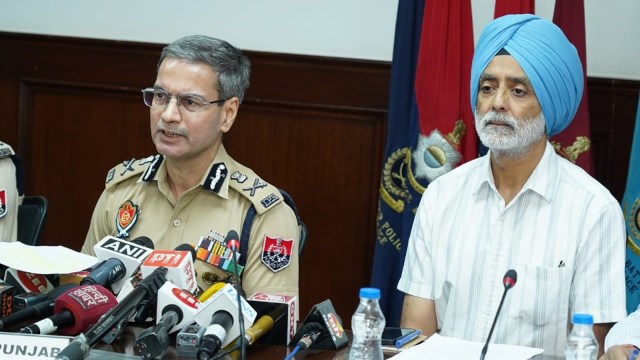Punjab DGP’s deadline: end drug menace by May 31, deploy anti-drone systems on border by October
Besides, 5,500 home guards would soon be recruited and deployed along the Indo-Pak border to curb drugs and arms smuggling, the DGP said.
 Punjab Director General of Police Gaurav Yadav addresses a
press conference in Chandigarh on Monday. (Source: Express Photo)
Punjab Director General of Police Gaurav Yadav addresses a
press conference in Chandigarh on Monday. (Source: Express Photo)The Punjab Police would deploy anti-drone systems on the Indo-Pak border by September or October to check drone ingression for smuggling drugs, arms and ammunition from Pakistan to India, Director General of Police (DGP) Gaurav Yadav said on Monday, as he also set May 31 deadline to eradicate the drug menace from the state.
“The trials of anti-drone systems have been completed, and these will be deployed as a second line of defence in coordination with the Border Security Force (BSF),” the DGP said.
Besides, 5,500 home guards would soon be recruited and deployed along the Indo-Pak border to curb drugs and arms smuggling, the DGP said.
The DGP was accompanied by Special DGP, Anti-Narcotics Task Force (ANTF), Kuldeep Singh, ADGP (ANTF) Nilabh Kishore and IGP (Headquarters) Dr Sukhchain Singh Gill to address the media.
On March 4, Punjab Cabinet ministers Harpal Singh Cheema and Aman Arora had attended a demonstration of the anti-drone technology held by the Punjab Police at PCA Stadium in Mullanpur, Mohali. The event showcased cutting-edge anti-drone solutions from three public and private sector companies aimed at countering drone-based cross-border smuggling of narcotics, arms and explosives along the border with Pakistan.
On March 19, Ministers Laljit Singh Bhullar and Aman Arora inspected an anti-drone system at Nashehra Dhala village, 40 km from Amritsar near the Indo-Pak border.
“Due to meticulous investigation into the ongoing ‘Yudh Nashe Virudh’ campaign, Punjab achieved 89 per cent conviction rate in cases related to the NDPS ((Narcotic Drugs and Psychotropic Substances) Act since the launch of the drive on March 1, which is among highest in the country,” Yadav said.
As per information, a total of 836 NDPS Act cases were decided in the state, 744 of which resulted in convictions since March 1.
“A total of 144 drug kingpins were sentenced to rigorous imprisonment for 10 years or more, demonstrating the seriousness of law enforcement and judicial processes in drug trafficking cases,” the DGP said.
“As many as 4,659 FIRs have been registered under the NDPS Act since March 1. A substantial number of people being arrested are ‘big fish’. Also, a large number of arrests are made from tip-offs received from the public on the CM helpline. Punjab Police has registered 503 FIRs and arrested 659 persons based on information received from the public on the Safe Punjab Drug Helpline,” the DGP said.
The DGP has called a review meeting of all CPs/SSPs on Tuesday, where district police chiefs will present their strategies to eradicate drugs from their respective districts by May 31.
The DGP announced that a proposal was moved to establish 30 exclusive courts to deal with NDPS Act cases. “We have requested the state government to set up these courts as the existing judicial courts are already experiencing a heavy workload. New courts will be set up after taking concurrence from the Punjab and Haryana High Court and cost Rs 22.8 crore to the state government.”
About the ‘Mission drug-free Punjab’, Yadav said, “Punjab will be made drug-free by May 31. This means the availability of drugs on the streets will be zero. The CM reviewed the measures taken till now and a well-considered decision has been taken after assessing all efforts. All SSPs and CPs have been asked to lead from the front. They have been directed to plan and execute all measures that have to be taken. The objective is to cut all supply lines by May 31.”
The DGP said, “A rigorous assessment will be done, using intelligence inputs and other means after May 31 to look into the availability of drugs on the streets.”
“Those police officers who have done good work will be rewarded and officers who have given false claims and whose performance is not up to the mark, their accountability will be fixed. Our focus is not on figure-based targets, our focus is to break supply chains completely. The entire network is to be unmasked and all those who figure in that have to be nabbed,” he said.
Talking about breaking the financial backbone of drug smuggling, the DGP said, “Hawala networks that finance drug trade have to be dismantled. As many as 31 big hawala operators have been arrested and more than Rs 8 crore hawala money seized.”
“Illegally constructed properties on government land and those violating building by-laws are being identified by civic authorities and being demolished as per law,” he said.
Speaking about the Transfer of Prisoners Act, which was recently passed by the Punjab Vidhan Sabha, the DGP said, “It has been notified by the government after the President’s assent. We will identify prisoners who have to be sent outside Punjab.”
The DGP said Pakistan was trying to bleed India by a thousand cuts and the Punjab Police would give a befitting answer. “We have not only traced the networks after attacks in Punjab but we have also made recoveries of arms and ammunition in a pro-active manner. There is a tremendous economic setback for Pakistani drug smugglers due to our crackdown. There is a chaos in Pakistan.”
Sharing the outcomes of the ongoing ‘Yudh Nashian Virudh’, which has completed 59 days, the DGP said, “Police teams have arrested 7,414 drug smugglers, including 1,877 big fish, after registering 4,659 FIRs under the NDPS Act since March 1, and recovered 297 kg heroin, 100 quintals of poppy husk, 153 kg opium, 95 kg ganja, 21.77 lakh tablets/capsules/pills and Rs 8.03 crore drug money from their possession. From these arrests, as many as 1774 drug smugglers were arrested from 755 identified drug hotspots during at least 908 repeated targeted and effective CASO operations.”
Since the Punjab Police has adopted “zero tolerance” to use of force against police, the DGP said, “62 drug smugglers/gangsters have been injured in retaliatory fire by police teams in self-defence since March 1.”












